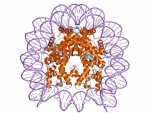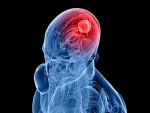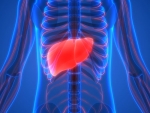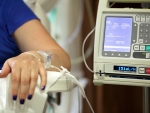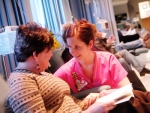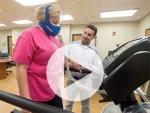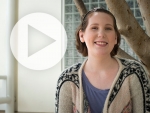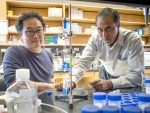Displaying items by tag: oneal comprehensive cancer center
These new results, led by primary author Warner Huh, M.D., strengthen the promise that vaccination with Gardasil 9 can reduce 90 percent of cervical cancers.
Tagged under
UAB provides ovarian cancer care beyond traditional interventions to include nutrition, supportive care, counseling and genetic testing.
Tagged under
This gene silencing by ubiquitinated histone is vital in normal embryo development, and it goes awry in some cancers.
Tagged under
Health care provider recommendation of HPV vaccines could help decrease secondary cancers in childhood cancer survivors.
Tagged under
Tagged under
This potential chemotherapeutic agent to treat glioblastoma — a primary brain tumor with dismal survival rates — is a novel small molecule inhibitor.
Tagged under
UAB is the only institution in Alabama chosen to date to participate in the TAPUR Study to help further understand targeted therapies in patients with advanced cancers.
This active drug-delivery system addresses the limitations seen for the anti-cancer drug BA-TPQ — poor solubility and low bioavailability.
Tagged under
Recent findings from an innovative nationwide trial indicate that the drug pembrolizumab, when used in combination with standard therapy, may provide positive results for patients with locally advanced breast cancer.
Tagged under
Michael Birrer, a leading medical oncologist at Harvard University, will take the reins as the new director of the UAB Comprehensive Cancer Center, succeeding the retiring Edward Partridge.
Tagged under
The UAB Cancer Center offers patients with advanced and rare cancer, including those with any stage of pancreatic and brain cancer, the opportunity to have no-cost tumor profiling, and patients may be matched with an appropriate clinical trial or recommend use of an FDA-approved drug.
Tagged under
The University of Alabama at Birmingham announces a partnership with Guideway Care to expand the reach of UAB’s proven cancer navigation program, Patient Care Connect, to patients nationally.
Tagged under
A new pilot investigation at UAB is rethinking the exercise paradigm for breast cancer survivors with reduced mobility, evaluating the utility of simulated high-altitude training for the purpose of enhancing health and physical activity.
Tagged under
UAB Comprehensive Cancer Center’s Fiesta Ball on May 5 will support the work of young cancer research scientists and patient and family services.
Tagged under
 At least 2,015 students will graduate and approximately 1,250 are expected to walk in the spring 2017 commencement ceremonies happening 9:30 a.m. and 2:30 p.m. Saturday, April 29, at Bartow Arena.
At least 2,015 students will graduate and approximately 1,250 are expected to walk in the spring 2017 commencement ceremonies happening 9:30 a.m. and 2:30 p.m. Saturday, April 29, at Bartow Arena.
Tagged under
- college of arts and sciences
- release
- collat school of business
- school of engineering
- school of education
- school of health professions
- graduate school
- school of dentistry
- school of medicine
- school of nursing
- school of optometry
- school of public health
- department of nutrition sciences
- department of english
- office of student involvement
- commencement
- university events
- university honors program
- oneal comprehensive cancer center
- international studies
Coalesce, a new support group for young adult cancer survivors, kicks off with a drum circle event at Railroad Park on April 15.
Tagged under
Unusual case of teen patient diagnosed with colorectal cancer receives innovative first-in-human clinical trial at UAB, reflecting a unique story of cancer and hope.
Tagged under
Cycliad, a community cycling event, will be held March 25 in Birmingham to benefit cancer patients at UAB.
Tagged under
Failure of hormone deprivation therapy used to slow prostate cancer in patients leads to castration-resistant prostate cancer, a lethal form of advanced disease with limited treatment options. Endostatin, used in combination therapy, may help delay onset of castration-resistant disease.
Tagged under


